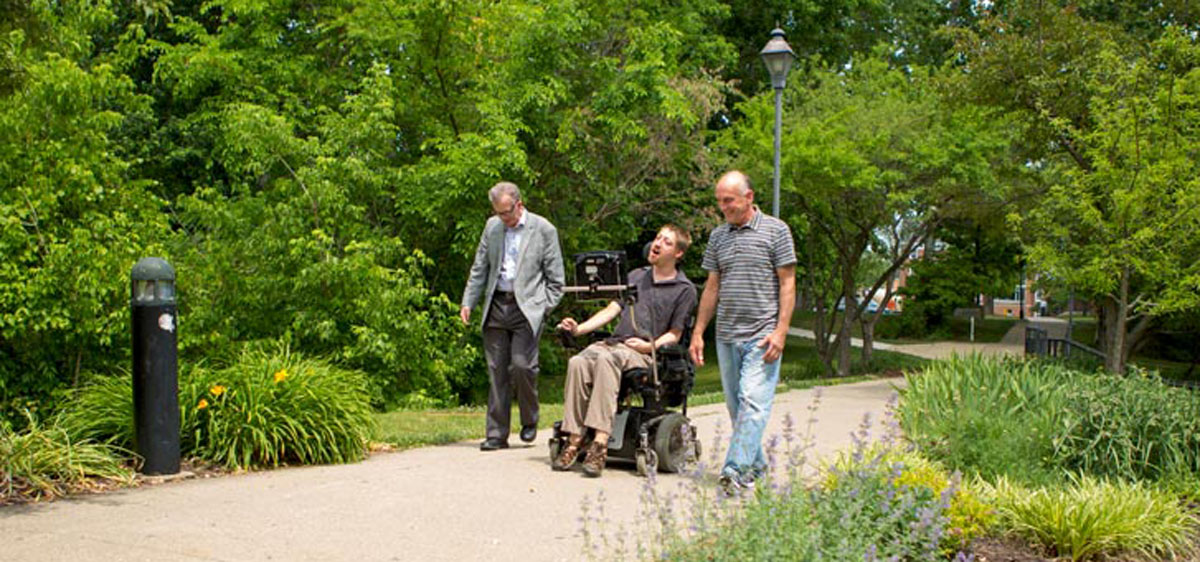Communiqué

OHIO Staff, Students Boost Space Studies Program Accessibility
< < Back toBy Morgan Borer and Pete Shooner
As International Space University (ISU) faculty and staff arrive in Athens for the Ohio University-hosted 2015 Space Studies Program (SSP15), members of the local organizing committee ensured OHIO’s campus is accessible to all its guests by not just analyzing raw data, but also testing facilities through a “wheels on the ground” approach.
ISU’s SSP15, running June 8-August 7, will bring more than 110 participants – and 150 faculty – from 30 countries around the world for an intensive summertime professional development program that connects academic and commercial space professionals including astronauts, engineers and scientists.
To help prepare campus, Assistant Director for the Office of Institutional Equity Darrell Purdy and Professional Ergonomist for the Department of Environmental Health and Safety Marty Dagostino, who had both been involved in accessibility planning for SSP15, contracted Noah Trembly, an OHIO technology and accessibility consultant who has cerebral palsy, for his expertise.
“As Marty and I were doing this work, one of the things that became clear is that it would be much more meaningful if you actually have someone who knows about the policies and could test facilities that are supposed to honor certain requirements. Noah was that person,” Purdy said.
Trembly, whose cerebral palsy limits his physical mobility to a wheelchair, and his verbal communication, assumed the role of an SSP15 participant to test OHIO campus accessibility, traveling the routes participants will take, using the same facilities they will and assessing transportation.
Trembly’s work was an extension of a November study completed by a team of OHIO engineering and physical therapy students. The interdisciplinary team evaluated a variety of areas on campus including restrooms, parking, sidewalks, ramps, signage, elevators and more. The students then submitted a detailed report to OHIO Facilities and the Russ College.
Trembly, Purdy and Dogostino completed assessments of all facilities SSP15 participants might use, including Adams Hall, Nelson and Shively dining halls, the OHIO Airport, Stocker Center, the Academic & Research Center and even local facilities.
“I think I made some recommendations that only someone with a disability could make,” Trembly said.
While Trembly completed his assessments, he took note of what was working and what could be addressed. These notes were then complied into a report for the SSP15 Local Organizing Committee (LOC), led by Russ College Dean Dennis Irwin and Grants Coordinator Steve Riesbeck.
“Noah’s insight – as well as his sense of humor and willingness to make a positive contribution – greatly added to the work done to prepare for ISU and will have benefits that will extend well beyond the conclusion of SSP15,” Riesbeck said. “His professionalism and passionate advocacy was a significant contribution to the LOC.”
“Noah wanted to make sure that people who came to this conference had appropriate access to medical care, so he also visited some medical facilities in the area. That’s something we didn’t think of – that was completely his idea,” Purdy said.
Fixing an entrance door, widening a sidewalk or enlarging a sign, might seem relatively simple solutions, but according to Purdy, there’s one thing that’s not quite as easy to fix – attitudes and stigmas about disabled individuals.
“The good news is, we can help change attitude. The bad news is, it can be an incredibly difficult task,” Purdy said. “Today, we can celebrate the Russ College of Engineering and Technology – they’ve been very supportive. But, there are still so many issues that need attention.”

